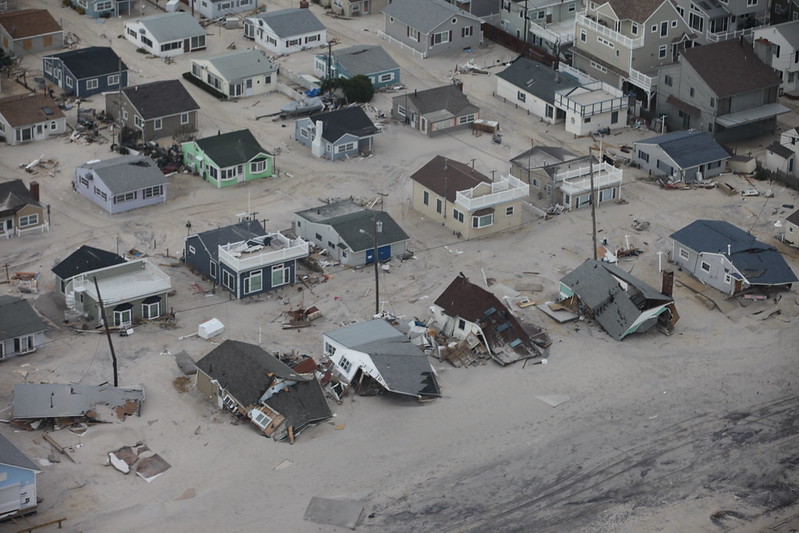Advocates for holding fossil fuel companies accountable in court for the substantial costs of climate change are urging New Jersey to sue oil majors like ExxonMobil, as over a dozen municipal and state governments have done over the past three years.
A month after a New Jersey senate committee passed a resolution calling on the state to take this kind of legal action, New Jersey’s Monmouth University hosted a virtual panel discussion on Wednesday, August 19 titled “Accountability for Climate Change Harms in New Jersey: Scientific, Legal and Policy Perspectives.” The discussion was intended to outline the case for New Jersey to file a climate accountability lawsuit ahead of the full state senate voting on the resolution, which could come later this month.
New Jersey Democratic State Senator Joseph Cryan, one of the lead sponsors of Senate Resolution 57, said during his opening remarks Wednesday that he is hopeful the resolution will pass the full state senate this month. The resolution specifically calls on New Jersey’s governor and attorney general “to pursue legal action against fossil fuel companies for damages caused by climate change.”
“This resolution urges the Governor and the Attorney General of the State of New Jersey to join 14 municipalities across the country and the States of Massachusetts and Rhode Island in pursuing appropriate legal action against fossil fuel companies, in order to shift the past and present costs associated with the damage caused by climate change onto the companies responsible for causing those harms,” the resolution states. The New Jersey Senate’s Environment and Energy committee voted to advance the resolution on July 20, 2020.
The climate accountability lawsuits that Rhode Island and cities like Baltimore, Maryland, and Boulder, Colorado, have filed against major fossil fuel companies demand that the companies help pay for the rising costs of climate impacts such as sea level rise, severe storms and flooding, and extreme heat and precipitation. The lawsuits allege the companies knew these impacts would occur from using their products, yet they publicly downplayed the dangers of fossil fuels in order to block climate policies.
A federal appeals court ruling allowing the city of Baltimore to sue the fossil fuel industry in state court of climate change damages puts the “much, much closer to a trial where the facts and the truth will emerge,” a climate law expert says.https://t.co/fkWx9HAI22
— InsideClimate News (@insideclimate) March 7, 2020
“Essentially the companies knew about the problem and they misled the public,” Marco Simons, an attorney at EarthRights International, said during the panel discussion. Simons is currently representing several Colorado communities in climate litigation against oil companies Exxon and Suncor.
New Jersey is already experiencing climate impacts like severe flooding, and billions of dollars in coastal property is at risk from rising seas. A 2019 study from the Center for Climate Integrity, a nonprofit that supports climate accountability lawsuits, estimated that New Jersey will have to spend $25 billion on seawalls by 2040 to protect lives, homes, and infrastructure from sea level rise, the sixth highest price tag for the lower 48 U.S. states.
“Who pays for damages and adaptation?” This is the key question underlying these climate lawsuits, Brenda Ekwurzel, director of climate science for the Union of Concerned Scientists Climate & Energy Program, explained during the panel discussion. Ekwurzel discussed research she and colleagues have conducted, called climate attribution science, showing that a large share of global warming emissions can be traced back to 88 companies, dubbed the “carbon majors.”
ExxonMobil alone is responsible for more than 3 percent of global CO2 emissions since 1965, Simons said. He said that because Exxon is incorporated in New Jersey, the Garden State has an especially compelling opportunity to hold the company accountable.
Simons did caution that lawsuits are “not a comprehensive solution” to the climate crisis and may not even be the best option, but said they do have a role to play absent public policy that addresses the enormous costs of adapting to unavoidable climate impacts.
“The only alternative right now is that the costs are going to fall on taxpayers and these costs are substantial,” he said.
Nathaly Agosto Filion, Chief Sustainability Officer of the City of Newark and another panelist during Wednesday’s event, agreed that climate accountability litigation is worth pursuing as a strategy for communities faced with enormous climate resilience costs.
The option of “holding the big carbon majors accountable is an incredible opportunity for municipalities facing these costs,” she said.
Main Image: Damaged homes along the New Jersey shore in the aftermath of Hurricane Sandy in 2012. Credit: U.S. Fish and Wildlife Service, public domain
Subscribe to our newsletter
Stay up to date with DeSmog news and alerts






